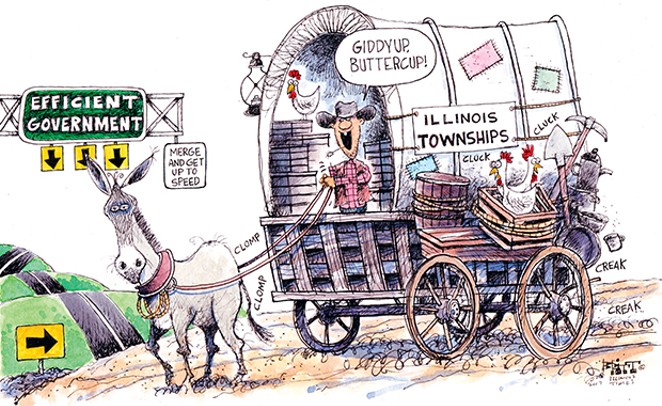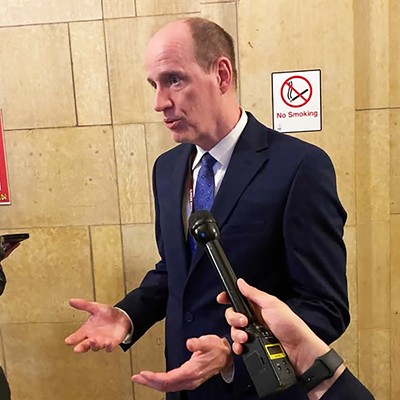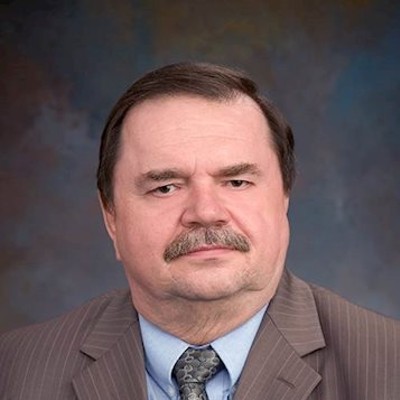Tax collectors in the Bible occupy the same social strata as sinners and prostitutes. The Beatles portrayed the taxman as a taunting, greedy parasite.
And then there’s Janine Stroble.
For 32 years, Stroble has been the tax collector in Springfield Township, home to 6,234 people who live in an area that stretches from Grandview to the outskirts of Abraham Lincoln Capital Airport. She makes house calls, visiting elderly and disabled folks to pick up property tax payments each spring, when the township handles tax bills. Come fall, when Sangamon County does the collecting, Stroble makes deliveries, stopping by homes of folks to pick up checks and convey them to the county treasurer.
She is hardly unpopular, having occupied the elected position of tax collector since 1985. The township’s tax collection season is as much a social event as a time to render unto Caesar.
“These people coming into this office when collection time comes, they’ll sit down with her and talk for half an hour or 45 minutes,” says Gary Budd, township supervisor. “They love that personal touch.”
“Sometimes we have to boot them out because other people are coming in,” Stroble says. They tend to be older than 50, and they like paper receipts.
Stroble, who earns $7,100 per year, says that she collected $1,049,114.85 this year from between 300 and 400 taxpayers who came to her instead of pointing and clicking or relying on the post office. Strictly speaking, it’s a completely unnecessary service, given that property owners can pay by mail or pay online or go to the courthouse if they insist on paying in person. And the overwhelming number of taxpayers, or banks that hold mortgages, do exactly that. Of the $350 million or so that’s paid in property taxes each year in Sangamon County, no more than 8 percent flows through the county’s 26 townships instead of the county treasurer’s office, says county treasurer Tom Cavanagh.
Stroble’s days as a tax collector are numbered, thanks to the state legislature and Gov. Bruce Rauner, who last spring signed a bill to eliminate tax collectors in Sangamon County. Last November, 75 percent of Sangamon County voters favored eliminating tax collectors in townships where they still exist – at least nine townships in the county already have done away with the job. But paring down government can be a slow whittle. The county citizens efficiency commission in 2014 recommended that collectors be eliminated, but that won’t happen, even with the new state law, until 2022, when terms for collectors expire.
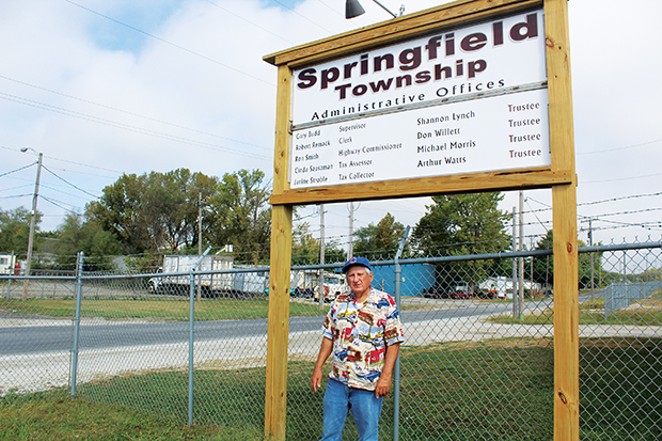
The new law capping fund balances isn’t the only measure the state has to restrict townships. The governor last month signed a bill that allows voters to eliminate townships that are wholly within cities and merge and consolidate townships in unincorporated areas. The governor also approved a law allowing voters to abolish township road districts, which have taxing authority distinct from whole townships. Rauner also signed a bill to abolish any township road district that doesn’t maintain at least four miles of roadway.
It has not, in short, been a good year for lovers of townships. Budd, the Springfield Township supervisor, is pessimistic about the long term. Fifty years from now, he says, his township may not exist, largely thanks to the growth of incorporated areas.
“We have a lot of cities, they’re going outside their boundaries and circling us,” he says. “They’re starting to surround us.” But Budd says he’ll never give up.
“I believe in township government,” Budd says. “The way people are putting this out, it sounds like there’s a lot of duplication. But you can’t duplicate the personal touch. I’m going to fight this until the cows come home.”
Bursting coffers
Townships in Illinois never have won universal acclaim. Consider the take of the Illinois Journal in 1849, when a new state constitution allowed for the creation of townships by popular vote.
Prior to a public vote, the Springfield newspaper published a primer on the new form of government, explaining the basics. The township would employ a supervisor, an overseer of the poor, constables, an assessor, highway commissioners and as many pound-masters (an old-fashioned term for folks tasked with confining stray animals) as needed. Anyone elected to a township office who refused to serve would be fined $25, save for recalcitrant pound-masters and overseers of the poor, whose fines for refusal to serve were set at $10. Noting that state enabling legislation setting the rules for townships ran to 34 pages, the paper near the end of a lengthy front-page article gave up trying to explain the finer points.
“We have only reached the ninth section (of the law),” the author wrote. “Persons wishing to make themselves fully acquainted with this matter had better examine the law at length. Our own opinion is that counties hereabouts are not in a situation to adopt this new system.”
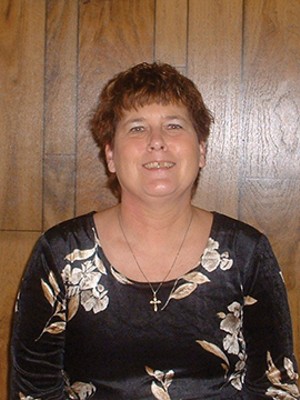
In 1878, the Sangamon County board of supervisors, thanks to an enabling law from the legislature, created Capital Township, with borders matching the city limits of Springfield. The rationale was fairness. Three-quarters of the taxes paid by Springfield Township residents came from property within the city, but residents from outside the city controlled how the money was spent, proponents of the new township said. City residents, creators of Capital Township decreed, should decide how to spend money from taxes generated by property within city limits.
Nearly 140 years later, the township could face a reckoning, thanks to a new state law that allows voters in Capital Township and 16 other of the townships in Illinois that are wholly within cities to abolish townships. Under the law that takes effect in January, voters could abolish such townships if both city councils and township boards agree to put referendums on the ballot. While townships in rural areas are responsible for maintaining roads, townships that share borders with cities with street departments have few duties.
Since 2014, Evanston and Belleville have eliminated townships wholly within municipalities. In Belleville, where township trustees in 2016 voted to dissolve the township effective last spring, the township had few duties other than dispensing money to the poor. With more than $500,000 in revenue, less than $203,000 was spent on welfare and social programs last year while nearly $285,000 went for administrative and overhead costs. For years, the township, which had 10 employees, took in more than it spent. By the end of fiscal year 2016, more than $850,000 had accumulated in township bank accounts, enough to run the township for nearly two years.
Belleville wasn’t alone in socking away money. Capital Township, where the owner of a $150,000 home pays $44 a year to the township in property taxes, had a fund balance of more than $2.1 million at the end of fiscal year 2016, when the township took in more than $2.3 million and spent slightly more than $2.2 million.
Cavanagh, the county treasurer who is also township supervisor, points out that township taxes have been reduced – 10 years ago, the owner of a $150,000 home paid $51 a year to the township. Cavanagh doesn’t see a problem with having nearly as much money in the bank as the township spends in a year.
“We’ve always thought it was prudent to have about that amount of money on hand,” Cavanagh said. “We would not let our fund balance grow to an inappropriate level. I believe our auditors have said it’s reasonable.”
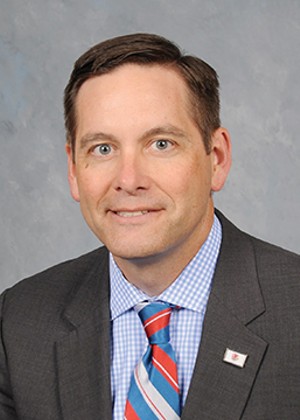
Over the years, Shelbyville Township, which collects more than $530,000 in taxes each year, accumulated nearly $1.4 million in fund balances as of the end of its fiscal year in 2016, according to Illinois comptroller records. With so much money on hand and few ways to spend it (the township, which has 13 employees, spent $163,370 on roads, $18,570 on social services and $187,557 on administration in 2016), the township board became generous in ways not envisioned when townships were created in the 19th century.
Shelbyville Township in recent years has given money, including cash from the road fund, to the American Legion, the local chamber of commerce, the Boy Scouts, youth athletic groups, a charity aimed at combating cystic fibrosis and a local meat shop that put together food baskets for the disadvantaged. The township helped pay for a post-prom party aimed at keeping high school students out of trouble. Shop With A Cop, a program that sends at-risk kids on Christmas shopping sprees with officers, got a $1,000 check. As much as $29,300 was donated to causes deemed worthy by the township in a single year, according to township financial records and Edgar County Watchdogs, a government watchdog group that blew the whistle.
Lawmakers took notice. In early September, Gov. Rauner signed a bill limiting the amount of money that townships can accumulate in funds (with capital funds excluded). It is, to be sure, a generous limit. Under the new law, townships cannot accumulate in any given fund more than two-and-a-half times the average annual expenditure over the previous three years. In Shelbyville, some township funds have 50 times the amount that’s typically spent in a year, says state Rep. Brad Halbrook, R-Shelbyville, whose wife became a township trustee earlier this year after a board of Democrats was voted out.
The move to cap fund balances was bipartisan, with state Rep. Carol Ammons, D-Urbana, cosponsoring the bill with Halbrook, who figures that Shelbyville Township has squirreled away about 10 times the amount of money that it needs. A 1969 state Supreme Court decision already established caps on how much money government can accumulate, Halbrook says, but now that there’s a law, folks are paying attention.
Mike Holland, who was named Shelbyville Township supervisor in July, says that the township may send checks to taxpayers to comply with the statutory limit on fund balances. “We’re going to be in a situation where, yes, we’re probably going to have to do some rebates,” Holland says. “Honestly, without going back and looking at financial reports, I don’t know the total. There are some accounts that are way over.”
Making charitable contributions with township funds wasn’t right, Holland says, but it also wasn’t nefarious. Former township officials simply didn’t know the law, he explains. “What those folks were doing, in their mind, was OK,” Holland says. “There was girls softball. There was boys baseball. Food baskets for folks who didn’t have much at Christmas time. That all sounds wonderful, except that it wasn’t legal. … We’re going to learn the law. We’re going to try to do it the way it’s supposed to be done.”
Urban vs. rural

In Springfield, which has the same borders as Capital Township, the job of assessing property is statutorily intertwined with county government. The Sangamon County treasurer is also the township supervisor and tax collector, thanks to state law, while the county clerk is also the township’s assessor.
“(Sangamon County clerk) Don Gray and I are unique, inasmuch as we are township officials, based on our elected county status,” says Cavanagh, the county treasurer. “We’re the only ones like that in Illinois.”
State Rep. Tim Butler, R-Springfield, who sponsored the bill that eliminates township tax collectors in Sangamon County, says that townships in rural areas are fundamentally different than townships in cities. Beyond keeping roads paved and plowed, rural townships supply accountability, he says, and it’s easy to complain if jobs don’t get done. “Folks in rural areas have a different view than in urban areas,” Butler says. “In a lot of rural areas, township government is your lowest common denominator, in a way. You can’t call your alderman.”
Jim Donelan, a Springfield alderman who is executive director of the Township Officials of Illinois Risk Management Association that provides insurance to townships, defends both urban and rural townships. Donelan, who sat on the citizens efficiency commission that recommended the elimination of township tax collectors in Sangamon County, allows that fund balances in some townships may appear high, but that can be a function of townships saving up to buy equipment. In Sangamon County, Donelan says, townships are responsible for maintaining 1,100 miles of roadway while the county takes care of 254 miles of road, and the average township road commissioner is paid $29,000 per year.
“We (the citizens efficiency commission) had a dialogue with the county engineer, who basically said, ‘We cannot handle the responsibility of 1,100 miles of roadway,’” Donelan says. “We found that townships are doing a pretty darn good job with a little bit of money.”
Counties aren’t clamoring to take responsibility for rural roads, Cavanagh says. While township tax collectors aren’t needed, assessors are another thing, he said. Someone, after all, needs to figure out what property is worth, he notes.
“A lot of people have positions on township government,” Cavanagh said. “In a lot of cases, they don’t go very deep below the surface and realize that these are indispensable services that have to be performed.”
Still, there remains an urge to eliminate or consolidate townships, with lawmakers and government reform advocates questioning the need for townships that share borders with cities (better known in government circles as “coterminous” townships). “I think coterminous townships, especially, are something we need to take a hard look at,” Butler says. “The idea that the county can provide a lot of the same services that Capital Township provides is a good idea to talk about.”
For practical purposes, the county and township already have morphed into one entity, says Brian McFadden, county administrator, given that assessments are done by the county clerk, the county treasurer is the township supervisor and payroll and other human resources tasks for the township are handled by the county.
“From my viewpoint, Capital Township and the county are already merged, just unofficially,” McFadden says. “We’ve walked down the aisle. I don’t know if we’ve said ‘I do’ in front of the priest yet. … Everything that a township does, the county does as well.”
While the county administers programs that help folks with heating costs and weatherization expenses, it does not provide help to the poor on the scale of Capital Township, which last year provided slightly more than $1 million in assistance to folks who had no other place to turn. Last year, nearly 46 percent of the township’s expenditures went for welfare, often on behalf of folks who didn’t have money for rent or utilities – the township writes checks directly to landlords and utility companies. It is not, the township says, an automatic handout.
“A lot of our work is vetting,” says Kathe Pierce, director of the township’s general assistance program. “We’re here to help as long as you meet our guidelines. Sometimes, we’re not dealing with honest people. They’re desperate. I don’t want to say they’re making up stories, but they’re leaving out information that’s important to us. I would love to be able to believe everybody who walks through the door. Unfortunately, the track record says we can’t do that.”
Assistance for food has been curtailed in recent years as the township determined that the poor can get nourishment from food banks and food pantries. The township has also phased out payments for dental and medical care because would-be clients qualify for Medicaid. But people who aren’t able to work can get checks intended as bridges while waiting for Social Security benefits to be approved. They’re required to repay the township if they receive backdated benefits.
Able-bodied folks get paid minimum wage to work 70 hours a month for such entities as St. John’s Breadline, the Computer Banc and Habitat for Humanity, and they must also look for jobs. It works out to as much as $577.50 per month, with a cap of nine months of township-sponsored workfare. If you get fired, you’re barred from the program for four years. Otherwise, you must wait two years between stints on workfare.
“There are limits,” Pierce says. People can receive financial help once every two years and five times in a lifetime, but no one has reached the lifetime limit of five grants for utilities or rent assistance.
The difference between the township and other welfare programs, Pierce says, is accessibility. Someone who needs help can walk into township offices on South 11th Street any day except weekends and Wednesdays and talk to a live person without making an appointment. After filling out an application, a person can get help within a week or so.
“We have constant communication with the clients,” Pierce says. “They can walk through our door, and we see them that day. We don’t have a ton of red tape. (State) public aid is overwhelmed. The clients go in there and they may have to wait two hours to see a caseworker. We’re getting them in the door and taking care of them efficiently. We’re always here, and our door’s always open.”
Contact Bruce Rushton at [email protected].

